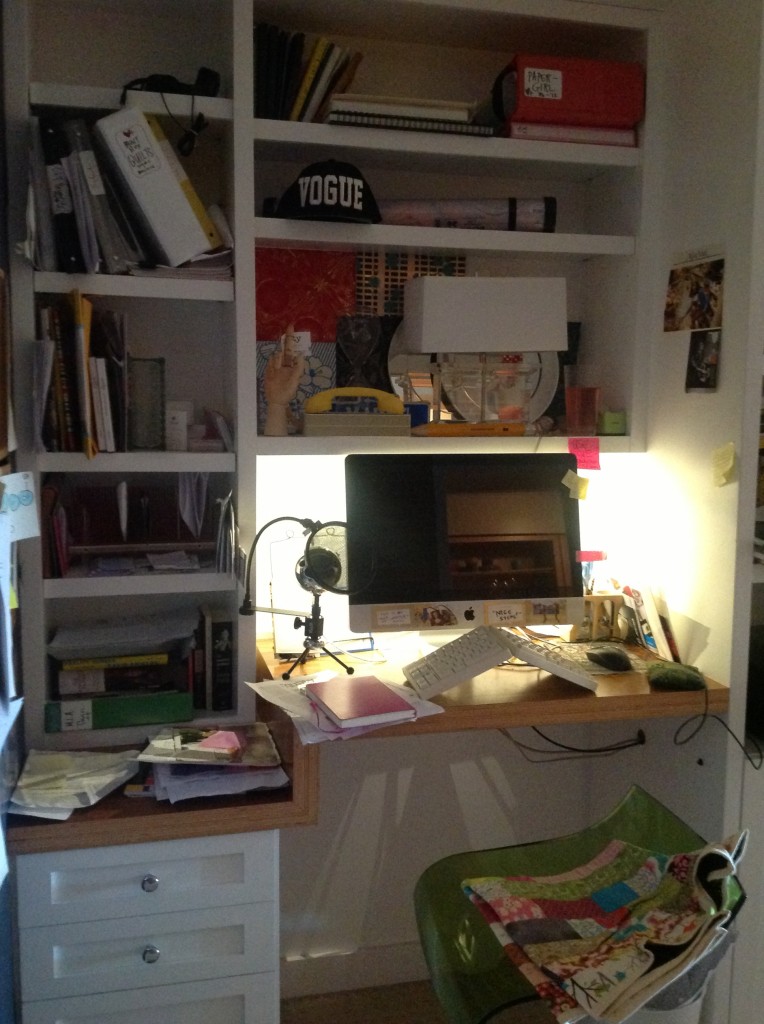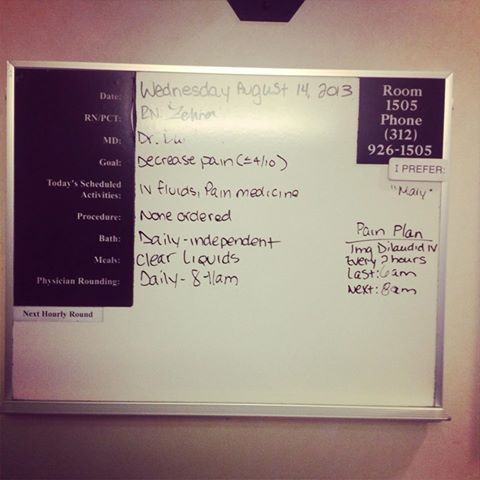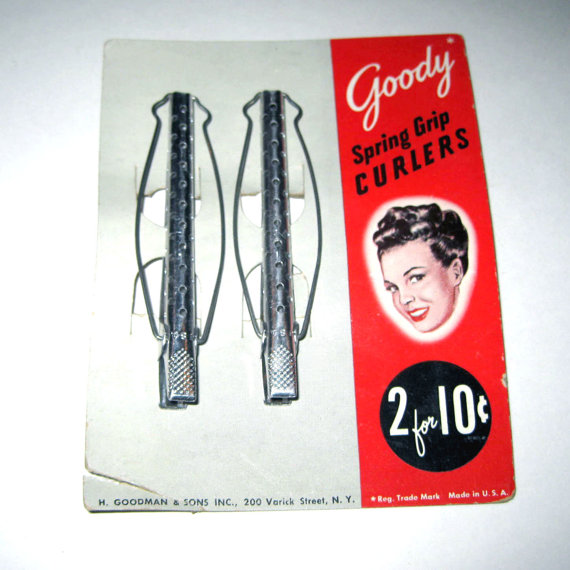

In my condo, there used to be an unusual hallway, a transition space from the front door area into the main room. It was too narrow to be a room room, but it was to large to skip over entirely. It posed a bit of a problem.
I work from home, and when I arrived in my place, I had two options: set up in the main room or take the guest bedroom over as my office. I did the latter for awhile, but then the show’s need for storage (I’m speaking about Quilty, here) and my need for natural light made this impossible. There’s no window in the back bedroom and it could work for boxes of fabric and notions but it wouldn’t work for my brain.
Then, one day, inspiration hit. The hallway. The office. The hallway office.

Forgive some of the small piles of paper and so forth; I tend to do that, but I assure you the piles have short lives.
I think of my hallway office as my mission control, probably because it is. From the desktop, which I had placed high so that I would stand to work instead of sit (this happens less than I had imagined it would because: barstool), I make Quilty the show, edit the magazine, create the blog (!), the podcast (you’ll see), and write, write, write all sorts of things, including far too many emails.
There is no furniture I like better than a chair at a desk. A desk is a tool of the mind, a sign of civilization. Dogs don’t have desks. Gorillas don’t have desks. People have desks, and from our desks in palaces, bland office buildings, or reconfigured hallways, we produce.
*Note thinking cap on second center shelf. I actually wear it when I need to think hard about something. I also chew gum when I’m writing. Helps me focus.
This was my view around 8pm Tuesday night, except the date read, “Tuesday, August 13, 2013”:

My life is full of wonder and I often feel that I pay directly for it through physical suffering. Dazzled by the lights in the Chicago skyline every single time you look? For this awareness and understanding, you will pay…ah, yes. Keening in pain every so many days. Feel a surge of love for all humankind each time you board a plane and believe in the possibility of every individual, with compassion and without reservation? That’ll cost you…your colon.
Plenty of people have a beautiful life and don’t pay with their health, I realize. This is just my particular situation, my lot. And honestly, it’s okay. I’m okay with the trade. The good is just that good.
I’m home now, but haggard. More soon, and thanks to the well-wishers. The well fishers, well, it’s weird that you’ve been calling, but I’m glad you’ve been catching those fish.

I needed to buy some barrettes the other day, so I went to my friendly neighborhood Target. I left with much more than barrettes, because that is Target’s evil way, but the barrettes were the most intellectually stimulating purchase — I just like Nutella; I don’t think about it.
In the barrette section within the hair section within the hairstyling section, there was a giant. And that giant was Goody. Heavens, the variety! Metal bobby pins, bobby pins colored like your hair, bobby pins made of silicone; barrettes with grippers, barrettes without, barrettes in neon colors, barrettes gray for the Woman of a Certain Age — and on and on. That’s not even approaching all the doo-dads (e.g., the StyleSpring), combs (e.g., teasing comb vs. compassionate comb) and the brushes (did you know there’s a brush now with toweling in it that dries your hair as you brush it?? America’s a heck of a country.)
When I got home, I had to look up Goody. I was stunned by just how many products for hair accessories one factory could make. I imagine the research and development team talking to the marketing team:
R&D: We’ve come up with something new.
MARKETING: Oh, no. (pause.) Okay, what is it?
R&D: It’s called “The Duck Tail.”
MARKETING: And what does that do?
R&D: (pause.) It gives you a duck tail.
MARKETING: Get Henry in here.
I got the name Henry from the Goody website. The origin of the company is interesting. Check it out:
At the turn of the century, Henry Goodman immigrated to the United States from the town of Gritsev in the Ukraine. With a single pushcart, he and his sons began selling rhinestone-studded hair combs on New York’s city streets. And in 1907, Goody was founded.
That’s pretty cool, isn’t it? Rhinestone hair combs from a pushcart. Think of all those lovely ladies in the early 1900s, haggling over the price of the combs, getting one down to a reasonable price of two cents from three. Remember what I said about America being a heck of a place? Goody is kinda proof. [Ed. note: I am not being paid to write this post.]
Oh, and the barrettes I got? They’re honestly the best barrettes I’ve ever used. 100% serious. They really grip and they don’t scratch.

I found a photograph of a little doggie at a flea market. Wanna see him? Okay, here he is:
I got him for $25 dollars. As you can see, he was irresistible. The cock of the head, the sparkly eyes. He had to be mine. I thought for a second he might’ve been that famous 1930’s Hollywood dog, Asta. But he’s not. He’s just a little dog. What’s neat is that his picture was taken by a Chicago photography studio that no longer exists, somewhere up north. The name was stamped on the back. Abbot Photography, I think?
I spared no expense with the frame. I went to a trusted frame shop and did him right. I feel like I rescued him, which of course makes him “a rescue.” Now he’s home. He’s warm and dry, beloved and safe. Safe in the home of a woman who really needs him.
I named him after my favorite poet: Philip Larkin.

There’s a performance series in Chicago called “Salonathon.” It was founded several years ago by my friend Jane. She and I met at the University of Iowa and I will never forget the night we really became friends. We went to The Foxhead, a cozy Iowa City bar with a lot of small taxidermy and one large jukebox, and we drank some beers. I remember how the bond felt as it formed. It felt great; I knew I’d know Jane for a long time.
Jane curates Salonathon every other week. There are musicians, dancers, poets, comedians, performance artists, writers, and acts non-categorizable. I have had the pleasure of performing in the series numerous times. Each show has a theme, and this week, the theme was “Money.” I did a piece that went over quite well, so I thought I’d post it. If you’ve ever wanted to be a better writer and/or suffer less in regard to money, you’ll like it. I edited for language a bit; Salonathon is raucous; this blog, decorous.
Thanks, Jane, for the beers and the life.
On Orwell, On Money (Sounds Hot)
By Mary Fons for SALONATHON
© August 2013
(MARY stands at a microphone. She has Orwell’s rules written on big placards. When she gets to a new rule, she reveals the next placard. MARY may or may not be drinking Tanqueray as she performs this piece.)
I divide my life in two: the time before I discovered George Orwell’s six rules for effective, honest writing, and my life after.
Orwell’s rules work for speaking just as well as for writing, and the theme at Salonathon tonight is “money,” so this brief address is about money and how to better speak (or talk) about it.
Orwell says in his rules and elsewhere, that language matters. It doesn’t matter in the way the Grammar Police say it matters; “ain’t” is a word and has been a word for long time so ignore them; he means that when we write and when we speak, we make seismic choices that shape our faces and our days. And as we make and spend money, we make the same kinds of choices. So when we speak about money? Double whammy.
Orwell’s first rule:
i. “Never use a metaphor, simile, or other figure of speech which you are used to seeing in print.”
Here is what you are not allowed to say and never allowed to write, ever, ever again: money doesn’t grow on trees; money is the root of all evil; money isn’t everything; the best things in life are free; you can’t take it with you.
Let’s pull one of those out: “Money doesn’t grow on trees.” We know what the point is. The point, is that to survive in the jungle, even though it looks like a fairly cushy jungle when you’re raised like most of us here tonight were raised, the earth is a vicious animal. You take away the skyscrapers and the iPhones and the streetlights and you’ve got a thankless prairie under your feet and some hardscrabbling to do, comrades.
We have to eek out a living while we’re alive. We gotta eat. We have to find shelter. It’s deadly serious. Plus, we’re wired to make more of our species. These are our charges as humans. So when you’re headed to work and you hate your work, rather than making it worse by muttering the phrase, “Welp, money doesn’t grow on trees,” say – or just think – “I am earning a living. I gotta eat. I need shelter.” And maybe work will seem more important, less magically crappy than when you say tired, cliched phrases over and over. They don’t help you.
ii. “Never use a long word where a short one will do.”
“The members of the Board of Governors and the Reserve Bank presidents foresee an implicit strengthening of activity after the current rebalancing is over, although the central tendency of their individual forecasts for real GDP still shows a substantial slowdown, on balance, for the year as a whole.”
That gush of Fedspeak comes courtesy of Alan Greenspan, during some godawful testimony from some Fed monetary policy report to Congress in 2001.
It means nothing. Language like that is engineered to mean nothing. It’s a card trick. Words and phrases like foresee implicit strengthening and central tendency of individual forecasts, these are the hand you’re watching here while the other hand takes your wallet over there and yes, that’s literal. Taxes come out of your wallet; Greenspan was talking, ultimately, about how much of the money you made today will be removed from your wallet. Reject this language. Do a close read, if you can stay awake — you must fight to stay awake! — and translate. It’s very hard to tell what he meant. But I think that phrase meant: “The money forecasters say the GDP is still bad, but after the budget is balanced, it will get better.”
iii. “If it is possible to cut a word out, always cut it out.”
Let’s say [SELECTED AUDIENCE MEMBER] here is going to have trouble paying her rent this month. She’s got two ways to handle the call to her management company/landlord.
Option 1:
“Hi, um, I’m calling to, well, it’s… It’s kind of a, an uncomfortable thing, but I am in a bind with my car. It is in need of some really crazy expensive repairs and without it, I can’t get to work because I can’t take the bus to work, because I work in the burbs three days a week. And I need to have the car repaired before Monday – it’s in the shop now – and for rent this month, I can pay it, but I can’t pay it till I know how much the car will be, the repairs. So it might not be that much, but it might be, I don’t know. So I’m hoping, I mean, if it’s okay, that I can pay my rent by the middle of the month? I know, I know, there’s a fee, it’s not the best, but I kind of can’t… You know, I don’t see… You know, it’s just, well, it’s just hard to see how I can do both and I need to like, figure that out.
Option 2:
“Hello, this [AUDIENCE MEMBER]. My rent will be late. I’ll include the $25.00 late fee when I drop it off. Thank you, goodbye.”
Dignity. Dignity, [AUDIENCE MEMBER]! It’s your money. It’s your language.
iv. “Never use the passive where you can use the active.”
What’s interesting about [AUD. MEMB] is that she lied about the car. When she gets off the phone with the management company, we hear the truth. And Orwell doesn’t say anything about not lying, so it must be okay as long as its in the active voice. Instead of saying to her roommate,
“I have spent all my money because I have gone shoe shopping.”
say:
“The money is gone. I spent it on shoes.”
And then get on with your life. Enjoy the shoes. They’re fabulous!
v. “Never use a foreign phrase, a scientific word, or a jargon word if you can think of an everyday English equivalent.”
News anchors, “financial correspondents,” and radio talk show hosts like foreign phrases because they sound fancy, but they are rarely used for any reason other than to make the news anchor or “financial correspondent” sound fancy or to avoid facing the truth. Example:
“The work was done pro bono.”
No, the work was done for free. Ah, but “free” scares people. You’re a lawyer who does something pro bono, you’re still kind of a scary lawyer. You’re a lawyer who admits to doing something for “free” and watch your email box erupt with people who want free legal advice. We hide behind foreign words ad nauseum. See what I did there?
I give you another (quick) example of this foreign phrasing that is garbage: caveat emptor, “let the buyer beware.”
“This drug is not tested.”
“This toy has caused choking death in fourteen infants.”
“Our lemonade is made with organic cow pee.”
Caveat emptor? Perhaps “run” is more to the point.
* * *
I hope I haven’t sounded pedantic.
The day I read Orwell’s rules, my life changed because my language changed. I’ve spent a good deal of time over the past few years not just “trying to earn a living,” but trying to earn a living that I love. Since the kind of living I love takes a fair amount of money – I’m a shoe person, too, [AUD. MEMB] — I have made choices that have led me to increased income and I continue to make those choices. I have important contract business beginning soon that will span the next few months and all this begins on Monday, when two Important People people will fly into Chicago to for a marathon meeting with me. Briefcases will be involved. There’s a lot to talk about.
Look, the language that I use in that meeting will either a) benefit my livelihood b) keep me where I am, or c) cost me. Any tools of language that I posses must be primed and ready so that I can deploy them when I need to. My language will make all the difference.
Your language is your gun. Your language is your livelihood. Your language is your sex, it can be a drug, it is an integral part of the rock n’ roll we all love. Don’t get lazy. Make more good language and you will make more money.
Ah. Orwell’s final rule:
vi. “Break any of these rules sooner than say anything outright barbarous.
Hey, [AUD. MEMB]. Give me all your money.
CURTAIN.